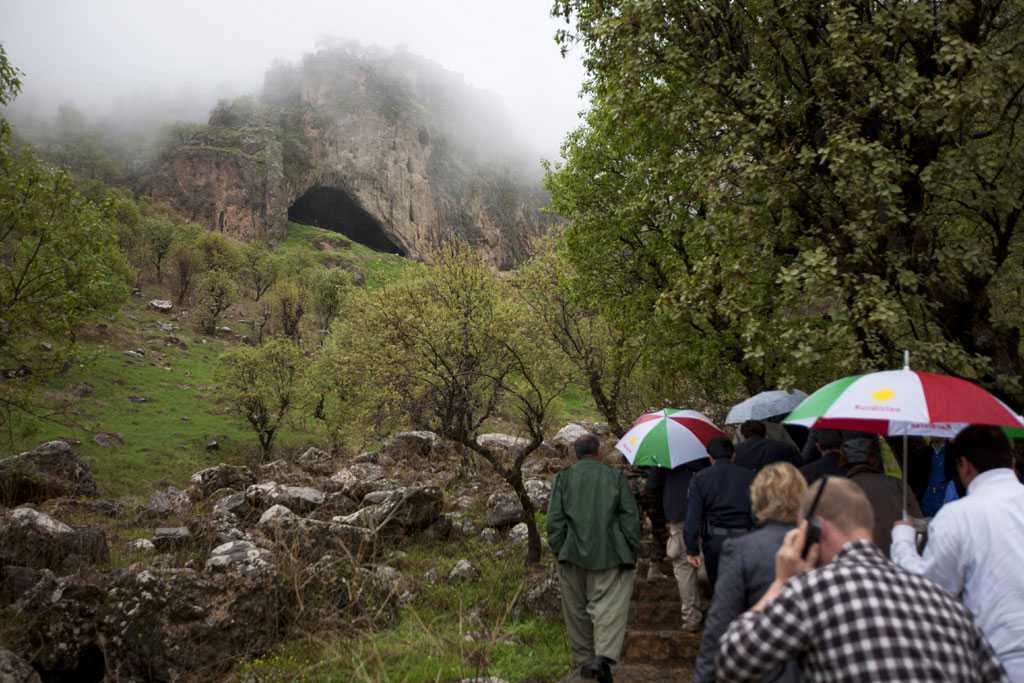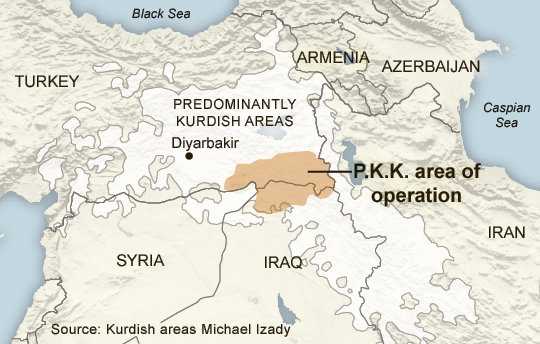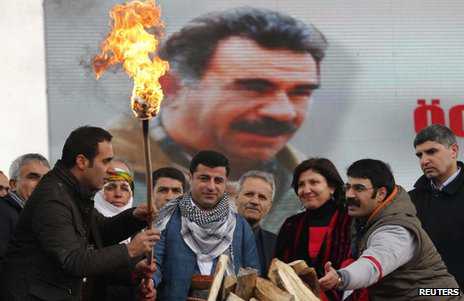Source and translation: BDP Press Office, Turkey
Let all the oppressed have a free and happy Newroz!
Greetings to all peoples of Middle East and Central Asia who celebrate newroz, the day of revival and rejoice, with the greatest participation in the world…
Greetings to all other peoples of the world who celebrate newroz, the landmark of a new era and sunshine, with enthusiasm and a democratic tolerance.
Greetings to all who take democratic right, freedom and equality as their guides…
Greetings to all Kurdish people, a folk that mothered one of the most ancient rural and urban civilizations at the lands of Mesopotamia and Anatolia from Zagros and Taurus Mountains to Tigris and Euphrates Rivers…
For Kurdish people, who coexisted peacefully and co-created this civilization with other peoples from different racial, religious, ethnic backgrounds; Tigris and Euphrates are siblings with Sakarya and Maritsa rivers. Mount Ararat and Cudi Mountain are friends of Kachkar and Erciyes Mountains. Haley and Delido dances are relatives with Horon and Zeybek dances.
This great civilization, these sister entities have been separated from each other by political oppressions, external interventions and group dynamics; they have been compelled to build entities ignoring justice, equality and freedom.
For the past 200 years, conquest wars, western imperialists interventions and oppressive mentalities have urged Arabic, Turkish, Persian and Kurdish entities to form artificial states, borderlines, problems.
The era of exploiting, oppressive ignoring mentalities is over. The peoples of Middle East and Central Asia are waking up. They are returning to their own. They are saying ‘no’ to the clashes that aim to provoke and harm each other.
Millions of people who are enthusiastically crowding for Newroz today speak of peace and fraternity, and demand a resolution.
The struggle I initiated against our collective desperation, ignorance and slavery was aiming to form a consciousness, mentality and spirit albeit all challenges.
Today, I see that this scream came to a certain point.
Our fight was never against a particular race, religion, sect or group, and it can never be.
Our fight was always against oppression, ignorance, injustice, lack of development and all sorts of pressures.
Today though, we are waking up to a new Turkey, Middle East and future.
To all youngsters who bless my call, to all women who add my message to their hearts, to all friends who consider my sayings, to all people who pay attention to what I am saying;
We have a new era starting upon us.
A door is opening from a process of armed resistance to a process of democratic politics.
A new process emphasizing on political, social and economic aspect is starting, a new mentality on democratic rights, freedoms and equality is developing.
We have sacrificed decades for this people, we have suffered great consequences. But all the sacrifice and struggle did not go unwasted. Kurdish people regained their true self-identity.
We have come to a point where we say “let the arms silence, opinions and politics speak”. The ignorant modernist paradigm has been deconstructed. The blood is dripping from this geography, regardless of Turkish, Kurdish, Laz, Circassian origin.
I, myself, am declaring in the witnessing of millions of people that a new era is beginning, arms are silencing, politics are gaining momentum. It is time for our [PKK] armed entities to withdraw from the [Turkish] border.
I strongly believe that whoever opens their heart to me, whoever believes in our struggle, will certainly consider the sensitivity of the ongoing process.
This is not an end, this is a beginning. It is not the end of our struggle, it is the start of a new sort of struggle.
Forming geographies based on a single ethnicity and nation is an inhuman invention that the modernity created to alienate us from our true selves.
Everybody is responsible for the creation of a free, democratic and egalitarian country that suits well with the history of Kurdistan and Anatolia. On the occasion of this newroz, I am calling all people with Armenian, Turkic, Assyrian, Arabic and other backgrounds to see the light of freedom and equality as much as Kurdish people do.
To people of Turkey;
Turkish people who know ancient Anatolia as Turkey should know that their coexistence with Kurdish people dates back to a historical agreement of fraternity and solidarity under the flag of Islam.
In the real sense, this spirit of solidarity does not and must not contain conquest, denial, forced assimilation and annihilation.
The politics of oppression, annihilation and assimilation represent the effort of an isolated elitist government that deny the existing history and fraternity agreement.
I am inviting everyone to build the democratic modernity together, as two prominent strategic powers of Middle East, departing from our culture and civilization to emancipate ourselves from the vicious cycle of cruelty which looks obvious to contradict our history and fraternity agreement.
It is time not for opposition, conflict or contempt towards each other, it is time for cooperation, unity, embracing and mutual blessing.
During World War I, Turkish and Kurdish soldiers have fallen martyrs together in Çananakkale [Dardanelles], they have fought together in Turkey’s Independence War, and opened together the 1920 National Assembly.
What our mutual past points out is our mutual necessity of forming our future together. The spirit of 1920 National Assembly era also enlightens the upcoming era of now.
I am inviting all representatives from oppressed peoples, classes and cultures; women who have been the most exploited class of all times, oppressed religious groups, cults and other cultural entities, worker class representatives, and other individuals who are excluded by the [capitalist] system to take part, understand and acquire the democratic modernity system.
Middle East and Central Asia is currently seeking a contemporary modernity and democratic order that would address its historical context. The search for a new model where everyone could live freely and in fraternity has become one of basic human needs – like bread and water. It is inevitable that Anatolian and Mesopotamian geography, and the cultural momentum in there will build this model.
We are currently experiencing a much more complex, contemporary and profound moment than Turkish and Kurdish people experienced almost hundred years ago during the foundation of modern Turkey with the National Pact (Misak-i Milli).
This time, we are building a model on the lesson of what we learned from the mistakes of our predecessors – embracing all devastated peoples, classes and cultures. I am calling all these people to realize an organization through a more egalitarian, independent and democratic method.
I am also calling all the Kurdish, Turkmen, Assyrian and Arabic people in today’s Syria and Iraq who have been left wrongly out from the borders of the National Pact to discuss, become aware and decide on their realities on the platform of a “National Solidarity and Peace Conference”.
The broadness and inclusivity of saying “we”, an important pillar in the historical context of this geography, has been narrowed to a “singularity” under the arms of elitist administrations. It is time to give “us” its old sense spirit and practicality.
We will unite against whom are trying to divide and conquer us. We will unite against who are trying to tear us apart.
The ones who are unable to read the spirit of time will inevitable end up at the junk of history.
The peoples of the region are witnessing a new dawn. War-tired peoples of the Middle East want to be reborn and get up on their feet. This newroz is a precursor to all of us.
The prophecies uttered by Moses, Jesus and Mohammed are becoming true now, the humanity is regaining its dignity again.
We are not in a position to reject all the values of Western civilization. We are taking the values of enlightenment, freedom, equality and democracy, and synthesizing them with our own norms.
The basis of our new struggle is ideas, ideology and democratic politics, and to launch a democratic movement.
Greetings to all who give life to this process and support democratic peace!
Greetings to all who take responsibility for the fraternity, equality and democratic freedom of people!
Long live Newroz, long live the fraternity of peoples!
Abdullah Öcalan, İmralı Prison, March 21, 2013
 A wide view of Shanidar Cave in the Kurdistan Region of Iraq. UN Photo/Bikem Ekberzade
A wide view of Shanidar Cave in the Kurdistan Region of Iraq. UN Photo/Bikem Ekberzade



